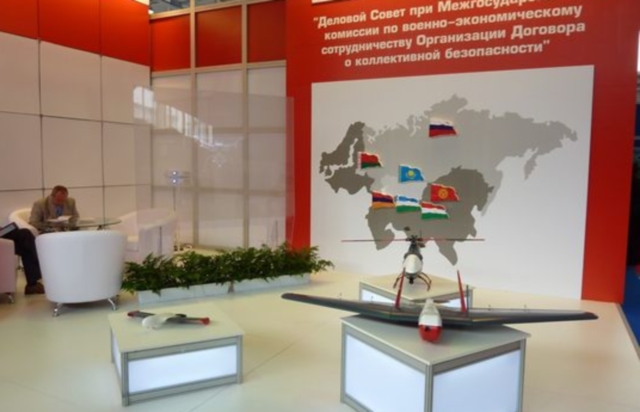 Perhaps the most intriguing exhibit at Kazakhstan’s KADEX defense expo was a sleek, modern booth showing off several mockup UAS in front of a backdrop advertising the “Business Council of the International Commission for Military-Economic Cooperation of the Collective Security Treaty Organization.”
Perhaps the most intriguing exhibit at Kazakhstan’s KADEX defense expo was a sleek, modern booth showing off several mockup UAS in front of a backdrop advertising the “Business Council of the International Commission for Military-Economic Cooperation of the Collective Security Treaty Organization.”
The CSTO, the political-military alliance? Was selling drones? Well, sort of. I inquired further and discovered that the booth actually belonged to a new company (established at the end of last year), the Interstate Corporation for Development. The company’s aim is “Development of Scientific-Industrial and High-Tech Cooperation in the CSTO Countries,” according to its website, and its CEO is Ivan Polyakov, also a senior official in the CSTO. The company was formed from two Russian defense firms as well as one in Tokmok, Kyrgyzstan, Ak-Maral, and the company is also looking to expand into Armenia and even non-CSTO member Ukraine, company spokesman Sergey Demensky told me.
He didn’t mince words: “Our aim is to recreate the traditional links and cooperation that existed in the Soviet era,” he said. To this end, the company is now marketing military communications equipment, as well as the drones they were showcasing. As is often the case with the CSTO, the details behind this ambitious goal were hard to come by. Why did the CSTO need its own defense manufacturing? Kazakhstan is setting up its own drone manufacturing with Israeli companies, and is building its own communications equipment with French firm Thales. (Demensky suggested that his company was competing with Thales, and complained that the “French lobby” was exerting undue influence in Astana.)
In another sign that the CSTO is getting more involved in the business side of the military, the defense ministers of the organization’s member states met in Astana, and among the issues they discussed were “joint production of military equipment,” and cooperating on servicing of aircraft, armored vehicles and air defense systems, as well as the equipping of CSTO rapid reaction forces. Again, details were scarce. The CSTO held a seminar at KADEX, but it was closed to the press.
When I spoke with Kazakhstan defense officials, I asked them about business cooperation with the CSTO, and though they all endorsed it generally, they were vague on what that might mean. “CSTO countries have a common history, and our defense business has common roots, so cooperation is in our mutual interest,” said Deputy Defense Minister Talgat Zhanzhumenov. But he also mentioned, unprompted, that the country’s defense acquisitions would follow a “multivector policy… We are not buying only from Moscow, we are buying the best.” Still, while the CSTO’s aims may still be opaque, it appears to be gathering momentum, so we should expect this business venture to grow, as well.
Source: Eurasia Net
